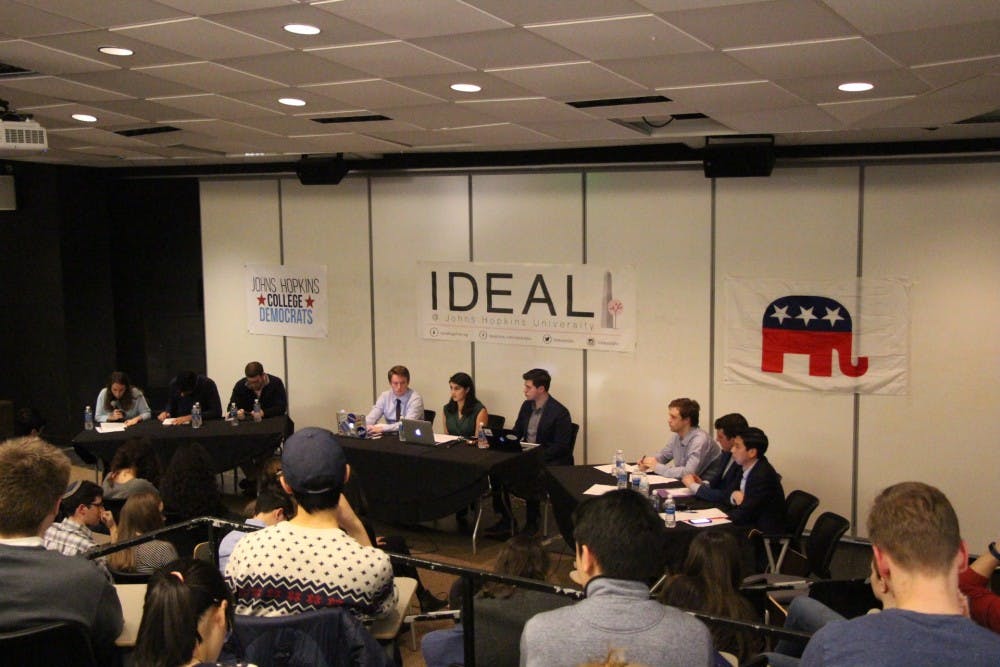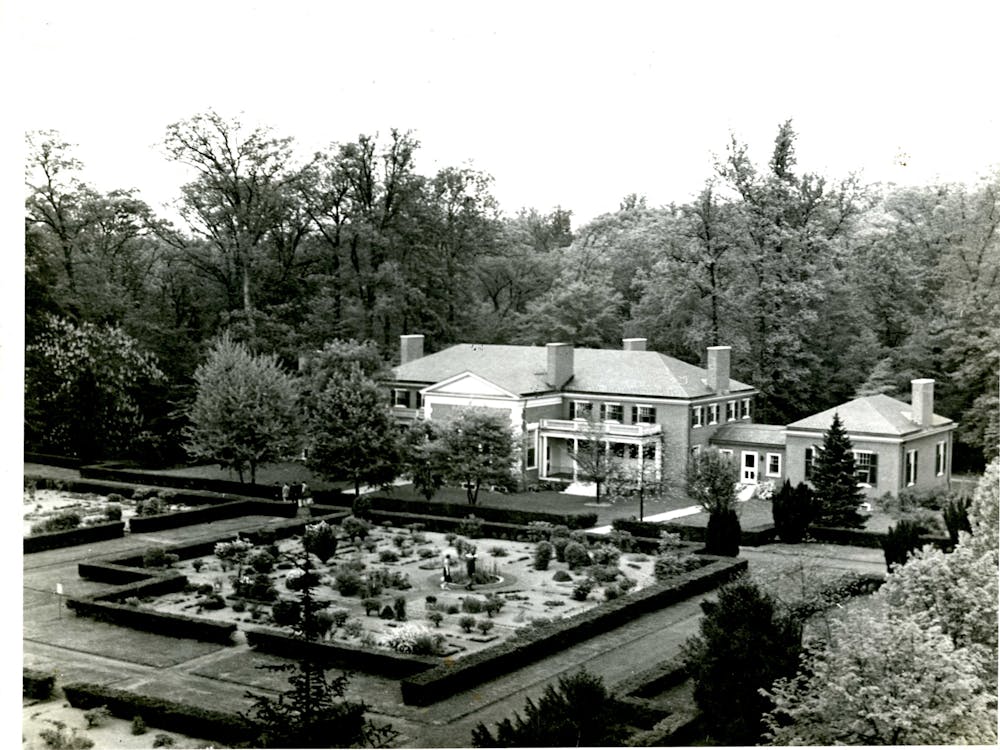Non-partisan student organization IDEAL hosted and moderated a debate between the College Democrats and Republicans on Wednesday, the one-year anniversary of the 2016 U.S. presidential election.
Three students from each group offered their opinions on the Iran nuclear deal, freedom of speech on college campuses and the most recent iteration of the travel ban.
The students began by discussing the Iran nuclear deal, an agreement reached in 2015 between Iran and six countries: the U.S., the United Kingdom, Russia, France and Germany.
The agreement was subsequently endorsed by the U.N. Security Council.
Under the agreement, Iran agreed to eliminate its stockpile of medium-enriched uranium, cut its stockpile of low-enriched uranium by 98 percent and reduce by about two-thirds the number of its gas centrifuges for 13 years.
While the Republican platform included strong criticism of the agreement, the Democratic platform offered its support.
During the debate, junior Joseph Klein, an executive board member of College Republicans, first pointed out three aspects of nuclear weapons, which included development (or uranium enrichment), weaponization and deliveries.
Klein argued that the terms of the agreement, also known as Joint Comprehensive Plan of Action (JCPOA), were insufficient.
“Since the agreement, Iran has in no way halted its development of delivery capabilities and has tested missiles on no less than five occasions since JCPOA,” he said.
He elaborated on some of Iran’s more recent behaviors on the global stage.
“There is also mounting evidence of a growing Iranian-North Korean military alliance in both nuclear weapon testing and missile technology,” Klein said.
On the other hand, junior Aaron Pultman, a member of College Democrats, argued that the focus of nuclear weapons should be on the “breakout time,” which is the time required to produce enough weapons-grade uranium (WGU) for one nuclear weapon.
“Before the JCPOA was signed, Iran’s breakout time was between two and three months,” he said.
He elaborated on why this new timeline was especially concerning.
“Through the JCPOA — and the goal is to lengthen that time by forcing Iran to ship out its uranium — the time has been lengthened to two years. In international policy, that’s a lifetime,” Pultman said.
Next, students debated freedom of speech on college campuses in light of recent student protests against “hate speech” across the U.S.
Sophomore Frank Guerriero, a College Democrat, began his argument by stating that the current dominant narrative of a “free speech” crisis doesn’t exist at all.
“What we have instead is the sensationalization of very few, very isolated and very remote incidents on campuses that don’t represent our educational system, our country or our generation,” he said.
He added that a global perspective was key to properly understanding the issue.
“The U.S. is still very far ahead of other countries in terms of accepting ‘hate speech,’” he said.
Guerriero added that students should recognize and call out extremely hateful speech.
“We shouldn’t condemn student groups or universities for considering some kinds of speech unacceptable,” he said.
He gave specific examples that have come up in recent public discourse about free speech.
“There is speech in this country that we all decide is unacceptable, like Neo-Nazism, white supremacism, and ‘peaceful’ ethnic cleansing,” Guerriero said.
However, senior George Gulino, a College Republican, argued that there is indeed a crisis of free speech on college campuses.
“Universities ought to be havens for free thought and free expression, with the unfettered exchange of ideas that drive scientific and scholarly innovation,” he said.
He identified a shift in the environment of college campuses that discourages some students from sharing their opinions.
“Students are afraid to express views considered unorthodox for fear of being condemned by their peers, by professors and by the administration,” he said.
Lastly, College Republicans and Democrats discussed the recent travel ban announced by the Trump administration. The latest ban expanded on previous versions and aims to impose permanent restrictions on travel rather than the previous 90-day suspension in the original ban.
The updated list of countries includes Iran, Libya, Syria, Yemen, Somalia, Chad and North Korea.
Junior Brian Montesinos, a College Republican, underscored the constitutionality of the ban with a 1950 Supreme Court statement on the authority of the executive state.
Furthermore, Montesinos discussed the potential value of the policy by going over the countries on the travel ban.
“North Korea is on the ban — that’s pretty self-explanatory. Second is Iran,” he said.
He elaborated on why Iran might have earned a place on the list, which he connected to recent developments in Syria.
“The Iranian government hasn’t cooperated with the U.S. government in regards to intelligence-sharing and has funded terrorist organizations. Syria is a failed state, and ISIS has occupied parts of Syria,” he said.
Montesinos elaborated that the Trump administration has tried to act in the best interest of the country by implementing the ban.
“There is no way for [the Syrian] government to be able to communicate whether the immigrants that come into the U.S. are terrorists or not,” he said.
He explained some of the difficult circumstances facing these countries.
“Yemen is facing a civil war right now. Most countries are justifiable with some type of logic,” Montesinos said.
He later further clarified his view in an email to The News-Letter.
“I do not believe the travel ban is good policy, but it is constitutional,” Montesinos wrote.
In response, College Democrat and senior Emma Cook argued that the Trump travel ban is not a constitutional legislative measure.
“Even with Venezuela and North Korea, the point still holds that the Trump ban is targeting Muslim countries instead of countries with terrorist activities,” Cook said.
She explained her concern that the ban might validate discrimination and harmful rhetoric in the United States.
“The ban allows for the objectivity that can easily let xenophobia and hate be exercised by immigration officials,” she said.
After the debate, audience member and freshman Yoohyun Kwon said that he enjoyed hearing opposing student viewpoints.
“The event itself is a great educational experience in that we are actually able to hear what the opinions of Republicans and the Democrats are,” he said.
He elaborated on the unique opportunity presented by the debate in allowing audience members to hear both sides.
“Traditionally, we tend to be biased, but this debate platform provided us with both sides of the argument,” Kwon said.
Freshman Nile Liu said that he grew up in a predominantly Democratic family, but he liked hearing from the Republican students in order to engage with different ideas.
“During this event, I actually agreed with the Republicans on some of the issues being discussed,” Liu said.
He commented on the differences he observed.
“It’s interesting how different the attitudes of the two parties were. The Democrats were more willing to stick to the rules while the Republicans were more about getting the point across,” he said.
Update: The original article has been updated to clarify one of the debater's comments about free speech on campus.























Please note All comments are eligible for publication in The News-Letter.